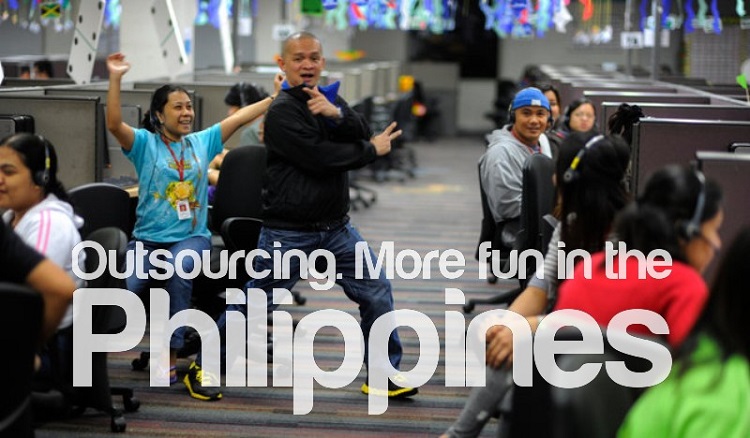

Quick Links
Quick Links
Do you want to save money, scale your business’ operations, and free up some of your time? If the answer to any of those questions is yes, outsourcing to the Philippines can be a beneficial move for you. Why the Philippines you ask? Easy. The Philippines is ‘the outsourcing destination of the world‘.
Outsourcing simply means strategically using outside resources (freelancers) to perform tasks traditionally assigned to in-house team members.
This practice allows business owners like to you have an advantage over competing companies. It also gives you the opportunity to focus on your core services and skills while a group of experienced service providers expertly handles other responsibilities.
Below are some of the tasks companies typically use freelancers for:
- Inbound customer service
- Outbound telemarketing
- Web design and development
- Graphic design
- SEO and online marketing
- Back office and admin support
- Accounting and human resources (HR) management
- Marketing and sales support
- Content creation, and more!
The Global Outsourcing Market
The global outsourcing industry has shown a steady stream of growth in the past few years. In 2018, Statista reported that the global outsourcing market amounted to USD85.6 billion. The revenue for business process outsourcing worldwide was recorded at USD23.6 billion.
Meanwhile that for information technology outsourcing was USD76.9 billion. A majority of the revenue came from the US, followed by Europe, and then by the Middle East and Africa.
While these numbers are marginally smaller than those from 2017, they still show that many companies feel inclined to outsource services.
This is particularly true for those in the e-commerce, banking and finance, healthcare education, and media and entertainment industries. This also suggests that outsourcing to the Philippines is a viable option for businesses worldwide.
The Philippines as an Outsourcing Destination
The Philippines has been one of the most popular outsourcing destinations for nearly 20 years. It comes second to India according to Tholons Services Globalization Index 2018.
Furthermore, PayPal’s 2017 Global Freelancer Insights Report revealed that:
- 60% of business owners who hire freelancers in the Philippines are from the United States
- 29% are from Australia
- 26% are from the United Kingdom and
- 20% are from Canada
From what started as a single call center in 1992, the industry has grown exponentially in the last three decades. In 2016, the market was projected to generate work for 1.3 million individuals. It was also poised for an annual growth of 17% in the call center industry alone.
However, it is not just big companies who are benefiting from this industry in the Philippines. Factors such as improvements in internet speed, the rise of freelance platforms, and the advent of digital tools have opened up the Philippine freelance economy.
This continuously presents an opportunity for small to medium companies and even startup ventures from across the globe to access highly skilled Philippine-based freelancers.
Today, 2% of the population or around 1.5 million Filipinos are engaged in freelancing. This market segment is expected to grow further in the coming years as more digitally adept contractors enter the market.
This is because more people are seeking more freedom to work anywhere. More individuals are also are leaning towards flexible work schedules and are enticed by the possibility of gaining higher income.
Concerns You May Have When Outsourcing to The Philippines
Delegating tasks can be challenging for a lot of business owners. After all, your business is your baby and you want to make sure everything is handled with care. These challenges can be even bigger when outsourcing to another country. Some of the typical concerns people have when thinking of outsourcing to the Philippines are:
Difference in Time Zones
Difficulty communicating is one of the first thing that comes to mind when people think about working with someone in another time zone. However, using a freelancer in a different time zone can actually be beneficial for your business. For example, if you’re looking for a freelance customer service representative, working with someone in a different time zone means you can have coverage during a wider range of hours.
Language Barrier
English is one of the natural languages in the Philippines. This makes communication much more efficient and effective. You won’t have to worry about struggling to communicate. If you’re hiring a freelancing for customer facing tasks, you can feel confident that they have a good grasp of English.
Experience and Skills
Freelancing is a popular part of culture in the Philippines, and it has been for many years. Whoever you hire has likely worked as a freelancer before and will have the level of experience you need. This also means that they’ll have had plenty of time to sharpen their skills.
Data and Privacy
Protecting data is always a concern when working with freelancers, and it becomes an even bigger one when you’re working with people outside the country. However, this isn’t something you need to worry about. In 2012, the Filipino government passed the Data Privacy Act to ensure that data is kept safe.
7 Reasons Why Outsourcing to the Philippines is the Best Move for Your Business
The Philippines has a lot in store for companies who need to outsource some of their business processes without compromising the quality of work. Here are nine reasons why outsourcing to the Philippines could be the best move you can make to grow your company:
1. Save Money
Outsourcing to the Philippines is an economical way of getting the talent you need for certain tasks and functions. This is particularly helpful for small companies and startups.
You can hire freelancers from the Philippines for a fraction of the cost it will take to outsource locally. Filipino freelancers often charge up to 75% lower than their counterparts. So, if you own a small business, you don’t have to burn a hole in your wallet just to find high-quality services.
For example, an SEO specialist from the Philippines can charge as low as $500 USD a month for their services. Whereas an in-house service provider charges up to four times that amount.
2. Access to Wide Variety of Talent
Don’t limit yourself to your local pool of talent. By expanding your search to the Philippines, you can give yourself more options.
The Philippines is a melting pot for a diverse range of talent every business can benefit from. There over a million freelancers in the Philippines so the possibilities are practically endless when it comes to finding the talent you need.
Regardless if you need help with data entry, customer support, research, web development and design, marketing, SEO, social media marketing, or sales, you’re bound to find highly-skilled freelancers who fit the bill. This is particularly helpful for businesses who wish to build a pool of talent with diversified skills.
Many freelancers in the Philippines also highly educated. The country is the most literate in southeast Asia with a literacy rate of more than 95%. Each year, top universities and colleges produce thousands of globally competitive graduates.
3. Reduced Legal Liability and Management Issues
Business owners sometimes have to face legal liabilities because of lawsuits filed by in-house staff. The good news is that outsourcing to the Philippines can save you from this kind of trouble. By outsourcing to the Philippines, you are hiring them as contractors and not as employees.
If you’d like to learn more about the difference between employees and contractors, take a look at this helpful resource.
4. Communicate Easily
The fact that English is commonly spoken in the Philippines means that you won’t have to worry about a learning curve when working with and training your freelancers.
What’s more, there are contractors who are proficient in other languages as well which can come in handy if you need someone to work on international projects.
5. Flexible Work Hours
Many freelancers are willing to work nontraditional hours. This means that you can have your business staffed at any time of the day without having to worry about paying shift differentials or overtime. Just remember to be sure that you have an idea of when your freelancers will be working so you can make sure your business is adequately covered at all times
6. Nationwide Freelance Culture
The Philippine government recognizes outsourcing as a major contributor to the country’s economic growth. This is why several policies and legislation, as well as infrastructure support, have been put in place to support the industry.
Among these are partnerships with tertiary education institutions to create curricula that will foster the outsourcing industry. Call center training is also available through the Technical Education and Skills Development Authority. Moreover, tax and non-tax incentives for foreign investments.
Furthermore, the Philippines has legislated the Data Privacy Act while the Freelancers Protection Bill is currently filed in the Senate.
7. Scale Your Business Quicker
Growth is essential for every successful business. But trying to keep everything in-house can limit your ability to scale. By hiring freelancers from the Philippines, you can take smaller tasks off of your in-house employees’ plates and give them bigger responsibilities that are more focused on taking the business to the next level.
How to Outsource to the Philippines

As with any business decision, you need to implement strategies to effectively outsource to the Philippines. Here’s how you can start your outsourcing journey:
Determine What You Should Outsource
Depending on the industry you’re in, you can outsource tasks such as:
- appointments, reservations, and logistics coordination
- research
- graphic design
- payroll
- conversion optimization
- bookkeeping, and more
The simple truth is that there are aspects of your business that may be critical to your operations but do not necessarily play a role in your overall strategy. Performing these tasks by yourself or getting in-house staff to do them can be cumbersome and, to a certain extent, frustrating.
Therefore, outsourcing them is a better choice particularly because there are professionals who are trained and skilled to do these.
Know When to Outsource
There’s a right time to outsource tasks and as a business owner, it’s up to you to determine when you should start doing so. Ask yourself these five questions:
- Does your internal talent have the skill to perform the tasks you want to outsource?
- Is the task a one-time need?
- Is it cheaper to outsource?
- Will outsourcing provide more value to your business?
- Does the task pose a competitive advantage?
Start Small
If you’re new to outsourcing, you might want to start finding a service provider for one-time or smaller tasks first until you get the hang of the process. You can start by finding someone who can write a short web copy or one small graphic. Doing helps in setting your expectations in the future.
Find a Reliable Freelance Platform
Nowadays, finding the right contractor doesn’t have to be a daunting task. There are platforms like the FreeUp = that can help you with finding pre-vetted freelancers who can suit your needs.
You may also seek recommendations from your business contacts who have experience with outsourcing professionals for their business.
Write a Specific Job Description
If you’re using a freelance platform to find the talent you need, it’s important to provide a detailed description of the project you need to outsource. Indicate deadlines and expectations together with information about the specific tools or software you need.
In doing so, you give freelancers a clear picture of what you need while reducing the risk of miscommunication and inaccurate assumptions
Determine Your Budget
Think of outsourcing as part of your capital investment. You are investing in the skills of contractors.
In doing so, you can be free to do what you do best. With that in mind, it’s important to set a realistic budget when outsourcing to the Philippines.
Remember as well that there may be additional costs when using the services of a freelance platform. So you need to factor that into your budget on top of wages you need to pay.
Set Clear Expectations
One of the trickier parts of outsourcing is communication. Sure, you can schedule Skype calls and phone calls with a freelancer but there are aspects of outsourcing that need to be written down.
Drawing up a contract will help you lay out the specifics of the project. This includes the services that will be provided by the contractor, the delivery schedule, and the payment for services.
Matters such as feedback, guidelines, and manuals also need to be put in writing. This helps avoid any potential confusion for you and for the contractor.
Start Outsourcing Now
Outsourcing to the Philippines lets you focus running the business without being hindered by tasks and functions that are best handled by someone with more experience. You can tap world-class talent to streamline time-consuming and resource-hungry tasks.
If you need help with services like e-commerce, Amazon, digital marketing, web development and design, customer service, and advertising, you can turn to FreeUp to get access to freelancers possessing 85+ skillsets to match your needs.
You may schedule a call with FreeUp, for a free 30-minute consultation about how to start hiring with FreeUp.

